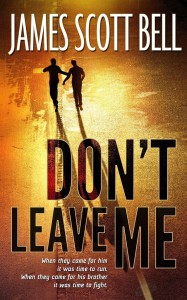James Scott Bell
@jamesscottbell
Today’s post is brought to you by:
I mention the book today because it’s the story of the bond between two brothers. Chuck Samson, an ex-Navy chaplain who served with a Marine unit in Afghanistan; and his adult, autistic brother, Stan, who has a heart as big as the Pacific. And what happens when killers come after them both.
This bond is something I call the Care Package, a story element that greatly enhances reader connection to the Lead.
The Care Package is a relationship the Lead has with someone else, in which he shows his concern, through word or deed, for that character’s well being.
This humanizes the Lead and engenders sympathy in the reader, even if the Lead happens to be a louse.
Let me give you a few examples.
In The Hunger Games, Katniss Everdeen is not just some lone rogue. She is the protector of and provider for her mother and sister, Prim. What she does in taking Prim’s place in the Games is the ultimate sacrifice of love. When she makes it, we are so much on her side that we will follow her anywhere, rooting for her all the way.
In Star Wars, the only reason Luke will not leave with Obi-Wan Kenobe is that his aunt and uncle need him on the farm. Here’s a boy who dreams of becoming a knight, but he can’t just leave his family. We like that in him. It shows nobility. Shortly thereafter, of course, his aunt and uncle are murdered…and Luke is off to fight the evil Empire.
Dorothy Gale cares about Toto in The Wizard of Oz. She’ll do anything to protect her innocent dog from the clutches of Miss Gulch.
Having a Care Package relationship keeps a character from being completely selfish. We don’t like such folk. We hope that we are not that way.
Scarlett O’Hara, for all her dithering selfishness, cares about her mother and father.
Mike Hammer, not the softest of PIs, cares about Velma.
Even the bitter and bigoted Walt Kowalski (Clint Eastwood) in Gran Torino cares…about his dead wife. It is only because of her final wishes that he even tolerates the young priest who keeps showing up to check on him.
The Care Package is one of the reasons we watched Breaking Bad. Walter White engages in a truly despicable act — cooking super crystal meth for sale on the street. Yet he holds some degree of sympathy. He gets into the trade
because he’s dying of cancer and wants to provide for his wife and handicapped son.
But as the story progresses, Walt becomes more ruthless and drags his former student, Jesse, into this dark world.
And yet…and yet…whenever Jesse gets in real trouble, Walt tries to get him out of it. He cares about Jesse in spite of all that happens. And Jesse cares about Mr. White. They forget about this caring at various times when they want to kill each other, but it always comes back when the chips are down.
Now that is good writing, and a great lesson. You can have a criminal as your Lead, and if you give him a Care Package, you’ll still hook the reader.
In short, the Care Package shows that even the worst characters have some shred of humanity in them which gives the readers hope they might, if circumstances are just so, be redeemed.
In my workshops on structure I stress the difference between the Care Package and a later beat called Pet the Dog. The latter is something that happens in Act 2, when the Lead takes a moment out of her own troubles to help someone weaker than herself. In The Hunger Games, for instance, Katniss helps the weakest of the players in the Games, little Rue.
The Care Package, by contrast, is a relationship the Lead has before the story begins. Thus, sometime early in Act 1, we are given a glimpse of this bond.
A word to you plotters/outliners. Consider using a Care Package as the emotional starting point for your developing story. That’s what I did with Don’t Leave Me. I got the initial idea of writing about a former military chaplain. I started to think about his backstory, and almost immediately came up with the idea of his having an autistic brother he has protected all of their lives, and now must do again when killers arrive on the scene.
It was such a strong emotional tie for me that it incentivized my wanting to write the entire novel, just to vindicate this relationship.
And now you pantsers, as you are writing along, maybe 10,000 words into that wonderful mess you love, why not pause for a moment and consider the lead character who is starting to come to life? You don’t have to worry about structure here, just ask yourself what kind of relationship can this Lead have with someone else that shows a caring spirit?
Heck, you’re a panster! Go ahead and write a scene like that. The benefit to you is the greater emotional connection you’ll have with your Lead. And that’s going to make for a better book.
And just to complete today’s commercial, please note that Don’t Leave Me is currently on sale at Amazon, Barnes & Noble, and Kobo.
So what character in recent fiction have you been drawn to, and why?
So what character in recent fiction have you been drawn to, and why?


